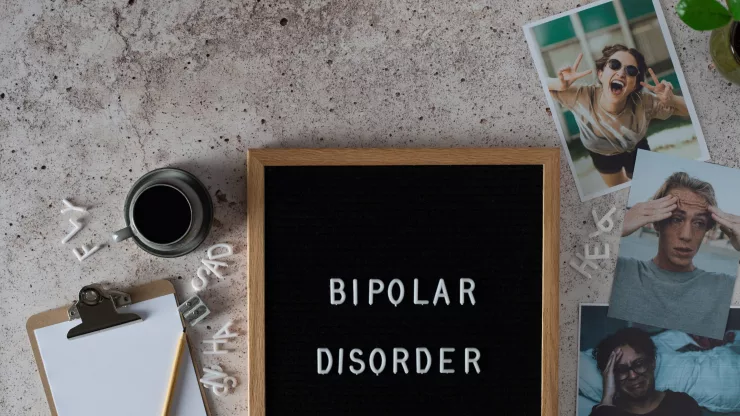Jump to Section
Understanding Bipolar Disorder
Bipolar disorder is a mental health condition that affects millions of people worldwide. It is characterized by extreme mood swings, ranging from periods of intense highs (mania or hypomania) to deep lows (depression). Living with bipolar disorder can be challenging, but with the right techniques, it is possible to achieve greater happiness and well-being.
Embracing a Positive Mindset: Coping with Mood Swings
One of the most important techniques for living with bipolar disorder is to embrace a positive mindset.
This means learning to cope with mood swings and finding ways to stay positive even during difficult times.
Some strategies for doing this include:
- Practicing gratitude: Take time each day to reflect on the things you are grateful for. This can help shift your focus away from negative thoughts and feelings.
- Staying active: Exercise is a powerful mood booster. Even a short walk or yoga session can help improve your mood and reduce stress.
- Avoiding triggers: Learn to recognize the things that trigger your mood swings and avoid them whenever possible.
Building a Support System: The Importance of Relationships
Another key to living with bipolar disorder is building a strong support system.
This includes friends, family members, and mental health professionals who can provide emotional support, guidance, and treatment when needed.
Some tips for building a support system include:
- Being open and honest: Let your loved ones know about your condition and how they can support you. This can help them better understand what you are going through and how they can help.
- Seeking out professional help: A mental health professional can provide guidance, therapy, and medication to help manage your symptoms.
- Joining a support group: Connecting with others who have similar experiences can be incredibly helpful. Look for local support groups or online communities where you can connect with others who understand what you are going through.
Mindfulness and Meditation: Finding Inner Peace
Mindfulness and meditation are powerful tools for managing bipolar disorder. These practices can help you stay present in the moment, reduce stress and anxiety, and find inner peace.
Some ways to incorporate mindfulness and meditation into your daily routine include:
- Practicing deep breathing: Take a few deep breaths whenever you feel stressed or anxious. Focus on your breath and let go of any negative thoughts or feelings.
- Meditating regularly: Set aside time each day to meditate. This can be as little as 10 minutes a day, but try to make it a consistent habit.
- Practicing mindfulness: Pay attention to your thoughts and feelings without judgment. This can help you stay present in the moment and reduce stress.
Self-Care: Prioritizing Your Physical and Mental Health
Self-care is essential for managing bipolar disorder.
This means taking care of your physical and mental health by getting enough sleep, eating a healthy diet, and engaging in activities that bring you joy.
Some self-care tips include:
- Getting enough sleep: Aim for 7-9 hours of sleep each night. Stick to a regular sleep schedule and avoid caffeine and alcohol before bedtime.
- Eating a healthy diet: Eat a balanced diet that includes plenty of fruits, vegetables, and whole grains. Avoid processed foods and sugary drinks.
- Engaging in hobbies: Pursue activities that bring you joy, whether it’s painting, writing, or hiking.
Pursuing Your Passions: Living a Meaningful Life
Living with bipolar disorder can be challenging, but it is still possible to live a meaningful, fulfilling life.
One way to do this is by pursuing your passions and finding ways to contribute to the world around you.
Some ways to do this include:
- Volunteering: Find a cause that you are passionate about and volunteer your time and energy.
- Pursuing education: Take classes or pursue a degree in a subject that interests you.
- Pursuing a creative outlet: Whether it’s writing, painting, or playing music, find a creative outlet that brings you joy.
FAQ
What is bipolar disorder?
Bipolar disorder is a mental health condition characterized by extreme mood swings, ranging from periods of intense highs (mania or hypomania) to deep lows (depression).
What are some common symptoms of bipolar disorder?
Some common symptoms of bipolar disorder include mood swings, changes in energy level, difficulty sleeping, racing thoughts, and suicidal thoughts.
How is bipolar disorder treated?
Bipolar disorder is typically treated with a combination of medication and therapy. Some common medications used to treat bipolar disorder include mood stabilizers and antipsychotics.
Therapy can help individuals manage their symptoms and develop coping strategies for living with the condition.

With a deep passion for personal development, Ben has dedicated his career to inspiring and guiding others on their journey towards self-improvement.
His love for learning and sharing knowledge about personal growth strategies, mindfulness, and goal-setting principles has led him to create My Virtual Life Coach.
Contact Ben at [email protected] for assistance.




